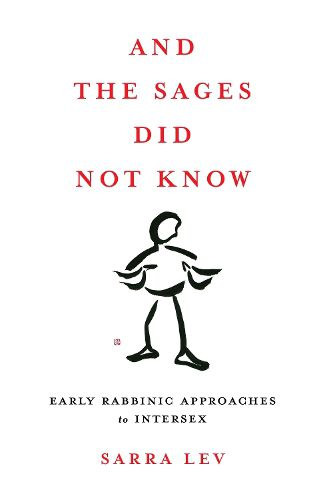Readings Newsletter
Become a Readings Member to make your shopping experience even easier.
Sign in or sign up for free!
You’re not far away from qualifying for FREE standard shipping within Australia
You’ve qualified for FREE standard shipping within Australia
The cart is loading…






This book explores the question: How did the rabbis of the first two centuries CE approach bodies that are born with variant genitals--bodies that they could not identify as definitely male or female? The rabbis had constructed a system in which every behavior was governed by one's sex/gender, posing a conundrum both for people who did not fit into that model and for the rabbinic enterprise itself. Despite this, their texts contain dozens of references to intersex.
And the Sages Did Not Know examines the rabbis' legal texts and concludes that they had multiple approaches to intersex people. Sarra Lev analyzes seven different rabbinic responses to this conflict of their own making. Through their rulings on how intersex people should conduct themselves in multiple circumstances, the early rabbis treat intersex people as unidentifiable males or females, as indeterminate, as male, as non-gendered, as sui generis, as part-male/part-female, as a sustainable paradox, and, finally, as a way for them to think about gender, having nothing to do with intersex people themselves.
This is the first such work that concentrates primarily on the potential effects of these rabbinic texts on intersex persons themselves rather than focusing on what the texts offer readers whose interest is rabbinic approaches to sex and gender or gender diversity. Although the rabbinic texts do not include the voices of known intersex people, these materials do offer us a window into how one small group of people approached intersex bodies, and how those approaches were both similar to and different from those we recognize today.
$9.00 standard shipping within Australia
FREE standard shipping within Australia for orders over $100.00
Express & International shipping calculated at checkout
This book explores the question: How did the rabbis of the first two centuries CE approach bodies that are born with variant genitals--bodies that they could not identify as definitely male or female? The rabbis had constructed a system in which every behavior was governed by one's sex/gender, posing a conundrum both for people who did not fit into that model and for the rabbinic enterprise itself. Despite this, their texts contain dozens of references to intersex.
And the Sages Did Not Know examines the rabbis' legal texts and concludes that they had multiple approaches to intersex people. Sarra Lev analyzes seven different rabbinic responses to this conflict of their own making. Through their rulings on how intersex people should conduct themselves in multiple circumstances, the early rabbis treat intersex people as unidentifiable males or females, as indeterminate, as male, as non-gendered, as sui generis, as part-male/part-female, as a sustainable paradox, and, finally, as a way for them to think about gender, having nothing to do with intersex people themselves.
This is the first such work that concentrates primarily on the potential effects of these rabbinic texts on intersex persons themselves rather than focusing on what the texts offer readers whose interest is rabbinic approaches to sex and gender or gender diversity. Although the rabbinic texts do not include the voices of known intersex people, these materials do offer us a window into how one small group of people approached intersex bodies, and how those approaches were both similar to and different from those we recognize today.